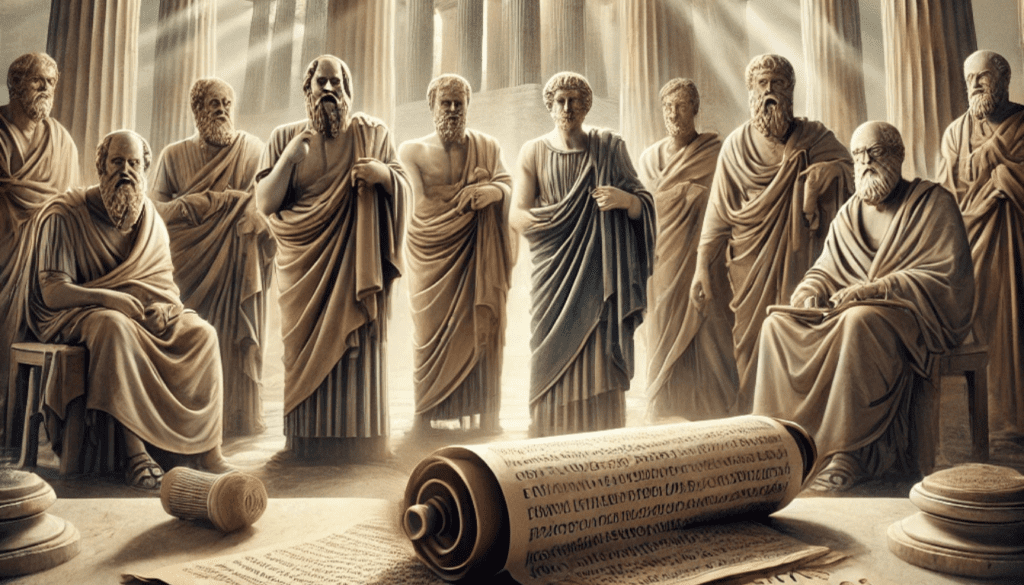Ancient Greek philosophy has left an indelible mark on the way we think about the world today. From the bustling streets of Athens to the quiet groves of Plato’s Academy, the ideas that emerged from this golden age of thought continue to shape our understanding of science, ethics, politics, and the nature of reality itself. This article explores the lasting legacy of Greek philosophy and its impact on modern society.
Table of Contents
The Birth of Western Philosophy
The story of Greek philosophy begins around 600 BCE in the Greek colonies of Ionia, along the coast of modern-day Turkey. Here, thinkers like Thales of Miletus started asking big questions about the nature of the world around them. Instead of relying on myths or religious explanations, they sought rational answers based on observation and logic.
This shift from mythical to rational thinking marked the birth of Western philosophy. The Greeks were among the first to question traditional beliefs and search for universal principles that could explain the world. This approach laid the foundation for scientific inquiry and critical thinking that we still use today.
Key Figures in Ancient Greek Philosophy
Ancient Greek philosophy is filled with influential thinkers whose ideas continue to be studied and debated. Here are some of the most important figures:
- Socrates (470-399 BCE): Known for his method of asking probing questions to stimulate critical thinking, Socrates emphasized the importance of self-knowledge and ethics.
- Plato (428-348 BCE): A student of Socrates, Plato founded the Academy in Athens and wrote extensively on topics like justice, beauty, and the nature of reality.
- Aristotle (384-322 BCE): Plato’s most famous student, Aristotle made significant contributions to logic, metaphysics, ethics, and natural sciences.
- Pythagoras (570-495 BCE): Best known for his work in mathematics, Pythagoras also founded a philosophical and religious movement.
- Heraclitus (535-475 BCE): Famous for his doctrine of change, summarized in the phrase “No man ever steps in the same river twice.”
These philosophers and many others laid the groundwork for centuries of philosophical inquiry that followed.
Major Schools of Thought

Greek philosophy gave rise to several major schools of thought, each with its own unique perspective on life and the universe:
- Platonism: Founded by Plato, this school focused on the theory of Forms, which suggests that the physical world is an imperfect reflection of an ideal, abstract realm.
- Aristotelianism: Followers of Aristotle emphasized empirical observation and logical reasoning to understand the natural world.
- Stoicism: This school, founded by Zeno of Citium, taught that the path to happiness was found in accepting the present moment without being controlled by desire for pleasure or fear of pain.
- Epicureanism: Founded by Epicurus, this philosophy sought to attain a happy, tranquil life, characterized by peace and freedom from fear.
- Skepticism: Skeptics questioned the possibility of certain knowledge and advocated suspending judgment on all beliefs.
These schools of thought continue to influence modern philosophy and psychology.
The Impact on Science and Mathematics
Greek philosophers made significant contributions to the development of science and mathematics:
- Astronomy: Greek thinkers like Aristarchus of Samos proposed a heliocentric model of the solar system, challenging the prevailing geocentric view.
- Mathematics: Pythagoras and his followers made important discoveries in geometry and number theory, while Euclid’s “Elements” became a standard mathematics textbook for centuries.
- Biology: Aristotle’s work in classifying living things laid the foundation for modern biology and zoology.
- Atomic Theory: Democritus proposed that all matter was made up of tiny, indivisible particles called atoms, an idea that would be confirmed by modern science thousands of years later.
The Greek emphasis on logical reasoning and empirical observation paved the way for the scientific method that emerged during the Renaissance.
Influence on Politics and Ethics
Greek philosophy has had a profound impact on political thought and ethical systems:
- Democracy: The concept of democracy, first practiced in Athens, was extensively discussed by philosophers like Plato and Aristotle.
- Justice: Plato’s “Republic” explores the nature of justice and the ideal state, influencing political theory for centuries.
- Ethics: Aristotle’s “Nicomachean Ethics” introduced the concept of virtue ethics, which focuses on the moral character of the individual.
- Human Rights: The Stoic concept of natural law, which posits that there are universal moral principles, influenced the development of human rights theory.
These ideas continue to shape modern political systems and ethical debates around the world.
Greek Philosophy and Religion
While Greek philosophy often challenged traditional religious beliefs, it also contributed to the development of religious thought:
- Monotheism: Some Greek philosophers, like Xenophanes, criticized anthropomorphic depictions of gods and proposed a single, abstract divine principle.
- Neo-Platonism: This later school of thought, influenced by Plato’s ideas, had a significant impact on early Christian theology.
- Rational Theology: Greek philosophical methods were later used by thinkers in various religious traditions to develop systematic theologies.
The interaction between Greek philosophy and religion demonstrates how philosophical ideas can influence and be influenced by spiritual beliefs.
The Spread of Greek Ideas
Greek philosophical ideas spread far beyond the borders of Greece:
- Roman Empire: As Rome conquered Greece, Greek philosophy became popular among Roman elites and influenced Roman law and culture.
- Islamic Golden Age: Greek philosophical texts were translated into Arabic, leading to a flourishing of philosophy in the Islamic world.
- European Renaissance: The rediscovery of ancient Greek texts in Europe during the Renaissance sparked new interest in classical learning and scientific inquiry.
This spread of Greek ideas contributed to the development of philosophy and science in many different cultures.
Ancient Greek Philosophy in Modern Education
Greek philosophy continues to play a significant role in modern education:
- Liberal Arts: The concept of a well-rounded education, including both sciences and humanities, has its roots in Greek philosophical traditions.
- Critical Thinking: The Socratic method of questioning is still used to develop critical thinking skills in students.
- Ethics Courses: Many modern ethics courses draw heavily on the ideas of Greek philosophers like Aristotle and the Stoics.
- Political Science: Greek political philosophy, particularly the works of Plato and Aristotle, is often studied in political science courses.
By studying Greek philosophy, students gain insights into the foundations of Western thought and develop skills in logical reasoning and critical analysis.
Criticisms and Limitations
While Greek philosophy has been hugely influential, it’s important to recognize its limitations:
- Gender and Class Bias: Greek philosophy was largely the domain of wealthy men, and often reflected biases against women and slaves.
- Lack of Empirical Methods: Some Greek philosophical speculations were not based on rigorous empirical evidence, leading to incorrect conclusions.
- Eurocentrism: The focus on Greek philosophy in Western education sometimes overshadows philosophical traditions from other parts of the world.
- Outdated Scientific Ideas: Many Greek scientific theories, such as the four elements or geocentric model of the universe, have been disproven by modern science.
Recognizing these limitations helps us appreciate Greek philosophy in its historical context while also acknowledging the progress made since ancient times.
The Enduring Relevance of Greek Philosophy
Despite its ancient origins, Greek philosophy remains relevant today:
- Ethical Debates: Greek ideas about virtue, justice, and the good life continue to inform modern ethical discussions.
- Political Theory: Concepts like democracy, citizenship, and the social contract have their roots in Greek political philosophy.
- Logical Reasoning: The methods of logical argumentation developed by Greek philosophers are still used in fields ranging from law to computer science.
- Self-Reflection: The Greek emphasis on self-knowledge and the examined life continues to resonate with people seeking personal growth and understanding.
By engaging with Greek philosophy, we can gain new perspectives on contemporary issues and connect with a rich intellectual tradition.
Conclusion
The legacy of ancient Greek philosophy is vast and enduring. From the foundations of Western thought to the development of modern science, from political systems to personal ethics, the influence of Greek ideas can be seen in nearly every aspect of our intellectual and cultural life.
While it’s important to recognize the limitations and historical context of Greek philosophy, its emphasis on rational inquiry, critical thinking, and the pursuit of wisdom continues to inspire and challenge us today. As we face the complex problems of the 21st century, the timeless questions posed by ancient Greek philosophers remain as relevant as ever.
By studying and engaging with this rich philosophical tradition, we not only gain insight into the roots of our own culture but also develop the tools to think critically about the world around us and our place in it. The legacy of ancient Greek philosophy is not just a historical curiosity, but a living tradition that continues to shape our understanding of ourselves and the world we inhabit.
Discover the must-visit cultural destinations of Greece
Internet Encyclopedia of Philosophy – Ancient Greek Philosophy













